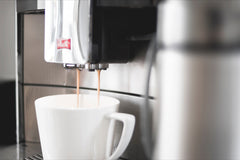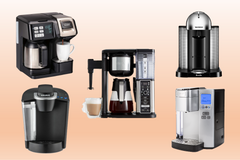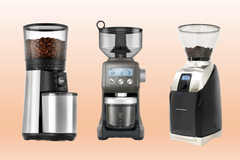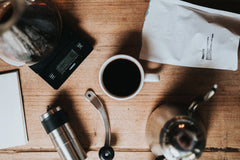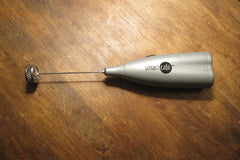There isn’t much worse than looking forward to a hot cup of coffee, only to find that it’s too bitter when you sip it.
Sure, bitterness is an element of most coffees, but excessively bitter drinks are unpalatable for most of us and can ruin the coffee drinking experience. If it’s a one off, you probably brushed it off.
But if you’re finding that your coffee is regularly bitter, it may be time to examine where things are going wrong and to implement the changes you need for a good cup of Joe.
Take a moment to read our short guide on coffee bitterness and how to resolve common causes of bitter coffee.
Table of Contents
When Is Coffee Too Bitter?
Some people would say that they find all coffee bitter - especially if they have a sensitive palette. At the end of the day, bitterness is an inherent characteristic of coffee beans.
However, the degree of bitterness can differ depending on the type of coffee bean, as well as how the coffee itself is processed and brewed.
Some people like a little bitterness in their drink.
Others can’t stand the slightest bitterness.
At the end of the day, only you can know when your coffee is too bitter for you and, chances are, if you’re reading this article, you’ve found yourself in this predicament.
What Makes Coffee Bitter?
If your coffee tastes bitter, there’s no single, set answer as to why this is happening.
Instead, there are a number of different potential causes and you may find yourself carrying out a process of elimination to determine which is specifically causing your problem.
Here are some of the most common causes of excessive bitterness, as well as a few pieces of advice on how to resolve them.
Reason 1: Over-Extraction
If you’ve heard people talking about brew-ratio, but aren’t quite sure what it means, this could be a key reason you’re producing bitter coffee.
When you brew coffee, the hot water extracts solids from the coffee beans, such as:
- caffeine
- lipids
- melanoids
- carbohydrates
- acids
The combination of the water and these solids results in the dark brown liquid we associate with espressos, Americanos and the base of coffee drinks with steamed milk.
The amount of coffee grounds you use in your drink versus the volume of water you use in your drink is known as “brew ratio” and can have a huge impact on the taste of the resulting beverage.
Getting your brew ratio off and using too little water can result in under-extraction and a sour cup of coffee.
Using too much water results in over-extraction and a bitter brew. Over-extraction is probably the most common cause of excessively bitter coffee.
Solution: Create a Brew Ratio and Stick to It
Of course, the straightforward solution to this issue is to create a brew ratio and to stick to it when creating your drinks. Of course, this can take some experimentation first.
Different people have different preferences, meaning that most people will use a slightly different brew ratio, perfectly tailored to their tastes.
There are two key ways that people tend to come up with a brew ratio:
- Some people use a recipe.
- Some people use a ratio.
If you use a recipe, you may, for example, stick to 100g of coffee per two liters of water when producing X number of cups of coffee.
If you use a ratio, you may stick to a ratio of 1:15, which would mean one gram of coffee for every 15ml of water. Either works and neither is superior.
You just need to figure out which you find easiest.
Reason 2: The Beans

What coffee beans are you choosing for the coffee you make?
If you’re noticing coffee you order from cafes is bitter, you may want to ask what beans they are using. Some beans are naturally more bitter than others. Generally speaking, robusta beans are more bitter than arabica beans. When you think about it, the clue is in the name.
Robust beans contain chlorogenic acids in higher concentrations.
When these acids are roasted at high temperatures, they can turn into chlorogenic acid lactones, which have notably bitter tones. If you are buying cheaper coffees, chances are, it’s made from Robusta beans.
These beans also contain less sucrose and fewer fats than other varieties of coffee, making them lower cost but (in many people’s opinion) more bitter and less pleasant.
Solution: Try Arabica Beans
The solution to this issue is simple.
If you find that you’re not enjoying the taste of Robusta beans, simply switch to Arabica beans and see if this resolves the issue at hand.
You may have to shop around a little to find specific beans that taste ideal, but the search is worth it.
Once you have a favorite coffee, chances are, you’ll stick with it for the foreseeable future.
Reason 3: The Roast

There are four primary types of coffee roasts. Most often, dark roasted coffees tend to be more bitter than light or medium roasts.
This is because the longer roasting process causes the breakdown of chlorogenic acid lactones, causing them to become phenylindanes.
Phenylindanes, in particular, have a very bitter taste to them.
Solution: Try Light or Medium Roast Coffees
If you find that you’re not enjoying dark roasted coffees, it’s logical to try out some light roasts and medium roasts instead.
These beans are removed from heat straight after the first crack (light roast) or before the second crack (medium roast). They tend to have lighter flavors and aren’t quite so bitter as dark roasts.
You could even try roasting your own beans to give yourself more control over this element of your brew.
Reason 4: Excessive Steeping
How long do you leave your coffee to steep?
Leaving your coffee steeping for too long does result in a bitter brew. This tends to be a particularly common amongst people who use a French press to create their drinks.
Leaving your coffee in the water once you’ve pressed the plunger down is an easy mistake to make, but it does mean that the coffee continues to extract until you come back to it.
Solution: Transfer Your Coffee to a Carafe
Rather than leaving your second cup of coffee in your French press to steep, transfer it to a carafe, where it can wait until you are ready to drink it, without becoming excessively bitter.
This will create more consistency between your drinks, rather than the second cup always being more bitter than the first.
Reason 5: Unclean Tools and Cups
We don’t tend to think too much about coffee residue in our brewing equipment if we intend to use it again later in the day.
Sure, everyone will clean their tools if they’re finished with their coffee for the day.
However, if you use your tools with coffee in or on them, then only give them a quick rinse before using them again later on in the day, you could be experiencing bitterness as a result.
This is because coffee residue left for a while on equipment or cups can cause odd tastes that will impact later drinks.
Solution: Clean Thoroughly Between Uses
The solution here is simple.
Just make sure to properly clean your coffee equipment and cups between uses - even if you are planning on having another cup of coffee again in an hour.
This doesn’t just help you to have a less bitter drink; it’s more healthy and hygienic in general too.
Bottom Line on Making Your Coffee Less Bitter
While there are other causes of bitter coffee, these are the most common culprits that coffee lovers face.
Hopefully, one of the issues highlighted above has brought light to a cause of your bitter drinks, and the solutions will help you to put wrongs to rights.

